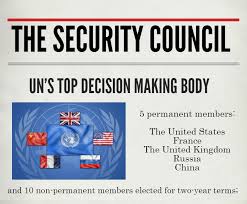Newspaper Article 13/10/2015
United Nations, the international body formed after the end of World War-II, since its creation has expanded enormously. Presently, the UN member states strength is 193. UN has been actively involved in peacekeeping operations world over. The debate to reform/restructure the Security Council is not new. The debate gained momentum following the end of Cold War. Some quarters think that the Security Council has generally performed well over the years. Despite having two groups led by US and the former Soviet Union, the Council continued with a balanced path. This group of countries do not support a radical change for a system that has delivered. The other group which support a reformed Security Council, hold the opinion that the Council’s present composition is reflective of the geo-political realities of 1945. Decolonization and globalization has led to an increase in the number of international actors. Emergence of non-state actors as well as regional groupings like EU, ASEAN etc. have reshaped the international environment.
Initially, the P5 did not approve to the idea of expanding the Security Council membership. However, the emerging strategic environment, in particular, the rise of China has changed the international landscape. Resultantly, some countries/regions have become more important. The new Silk Road strategy has brought into the limelight some regional players.
The Security Council consists of 15 members – 5 permanent and 10 non-permanent (reference Article 23 (1) of Chapter V). Chapter VII of the UN Charter on collective security provisions, give the Security Council legal authority to establish peace. As per, Article 30, “the Security Council shall determine the existence of any threat to the peace, breach of the peace or an act of aggression and shall make recommendations, or decide what measures shall be undertaken”. Further, Articles 41 and 42 give the Council the authority to decide what economic or coercive measures should be taken for restoration of international peace and security. Thus, the Security Council has the mandatory force to influence/or implement decisions. The permanent members of the Security Council have the right to ‘veto’ on a decision. If the permanent members do not agree to a decision, they can cast a negative vote, the ‘Veto Power’. But what gives the five permanent members the right to veto a resolution. Is it because they represent countries intellectually superior to the rest of the world; do they know what is best for the world. The P5 have exercised the right to veto at one time or another.
Seen Japan and Germany, the looser states of World War-II, both the countries are now important global players. Japan’s economic prowess coupled with the financial contributions to UN make it a natural candidate for the Security Council membership. Similarly, Germany’s politico-military credentials and economic progress strengthen its case for the Security Council membership. India is another candidate, aspiring to have a badge of honour by direct admission into the Security Council. India’s quest for Security Council membership is quite old. India, in 1997 officially declared its desire to become a permanent member of Security Council. It filed an application of Security Council membership in September 1999.
The criteria to induct new members will be based on an international actor’s economic and military power, or will a country’s contributions in UN peacekeeping missions would be considered. But what about a country’s record of human rights, can a violator of human rights be allowed Security Council membership. In line with the essence of UN charter (reference – UN ‘Commission on Human Rights’ and ‘Universal Declaration on Human Rights), a country with a record of human rights violations should be debarred from the Security Council membership. The contribution of countries in establishing peace and security in world should be taken into account while awarding them the permanent seat of Security Council. There should also be no room for a country, which has violated the UNSC resolutions. Besides, any reform in the Security Council should not trigger feelings of animosity among the weaker states against the developed countries. The regional representation should be made in such a way that it restores balance of power in that region.
Amna Ejaz Rafi,
Researcher, Islamabad Policy Research Institute (IPRI)
Disclaimer: Views expressed are of the writer and are not necessary reflective of IPRI policy.

